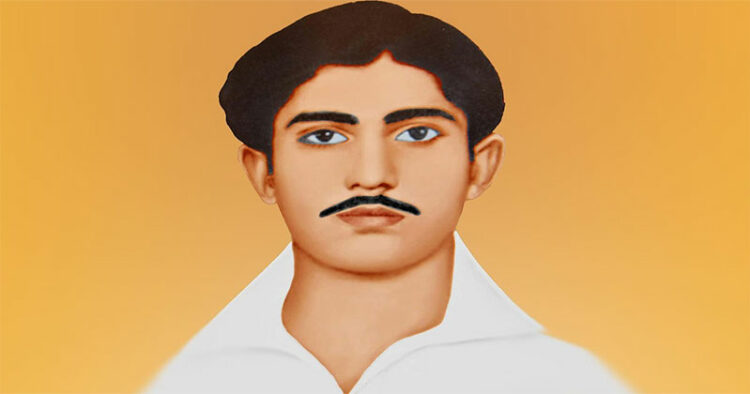Hemu was born to the Kalani family on March 23, 1924, in Old Sukkur and belonged to a middle-class family. Hemu Kalani, the eldest child of Shri Pessumal Kalani and Smt Jethibai Kalani received his primary education in the ancient city of Sukkur and his higher education at the renowned Tilak High School of Sukkur. His uncle, the late Dr Mangharam Kalani, a famous congress leader and a seasoned freedom fighter, had a lasting influence on the young boy.
When Gandhiji launched the Quit India Movement in 1942, it was at a time of freedom movement. Hemu Kalani, who was greatly influenced by the action and was inspired by his uncle, joined the Swaraj Sena, a revolutionary group and rose to its top official status. This group established a “Revolutionary Command” during one of its meetings in secret to carry out some daring revolutionary activities for liberating Mother India from the chains of colonialism.
Rarely would individuals of his age ever consider doing something for the country, yet here was a student about to take his matriculation exam who was fervently committed to the cause of driving the British out of India.
The Khudai Khidmatgars, led by Frontier Gandhi, had made the North-West Frontier province a veritable hell for the British Empire. On October 2 1942, the revolutionary group Swaraj Sena received top-secret intelligence that a train carrying military soldiers and equipment would travel between Quetta and Rohri to end the political movement there. Hemu Kalani, a fervent supporter of Indian Independence, decided to derail the railway to prevent the ammunition from reaching its destination. He convened an emergency meeting of his Revolutionary Group, during which it was planned that he and the other two associates would remove the fishplates from the railway near Sukkur and cause it to derail.
Unfortunately for the group, the noise they made during their operation was audible to the surrounding security personnel. His two companions escaped as they heard the soldiers’ loud footsteps, but the brave lad allowed himself to fall into their arms.
Hemu was subjected to third-degree torture by the British to expose the identities of his associates and the organisation to which he belonged. Still, he resisted and bravely took the brunt of the suffering. He took full responsibility and told the authorities that if their actions of sabotaging the freedom movement with weapons and ammunition were justified, then his intended act of derailing the train was also acceptable.
Little Hemu was prosecuted for treason against the British Empire then, and the authorities condemned him to life in jail. At the time, Sindh was under Martial Law, and his case was submitted to a Martial Law Court in Hyderabad or Sukkur. Colonel Richardson, the senior officer in charge, decided to set an appropriate example to put an end to the anticipated flurry of patriotic emotions and increase the verdict from life imprisonment to death sentence. after realising the enormous popularity, this brave boy had gained throughout the region and fearing that this little boy’s act of bravery would have a massive influence on the minds of the Indians. Hemu Kalani’s brother, Tekchand Kalani, said their father pleaded for mercy from all the influential British men.
Hemu was a picture of calmness and calm, unfazed by the threat of losing his life and eagerly anticipating D-Day when his name would be recorded in the history books. At the same time, his parents and supporters frantically tried to get his sentence reduced. He exhaled his final breaths on January 21, 1943, while grinning and uttering the phrases “Inquilab Zindabad” and “Bharat Mata Ki Jai.” It is widely accepted that Hemu, a fervent patriot, wanted that everyone who was him, including the British authorities, would shout national anthems when the officers asked him for his usual final wish before tying the noose around his neck.
In order to honour Kalani’s sacrifice and to encourage today’s youth, Sindhis commemorate January 23, 1943, as Sindhi Youth Day and Martyrdom Day. Kalani was cremated on the banks of the Indus on this day.
On August 21, 2003, the then Prime Minister Atal Bihari Vajpayee unveiled Hemu Kalani’s life-size monument at the Parliament Complex. There are numerous tributes in Kalani’s honour across the cities of northern and western India, including a school named after him in Shaheed Hemu Kalani Sarvodaya Bal Vidyalaya, New Delhi.




















Comments